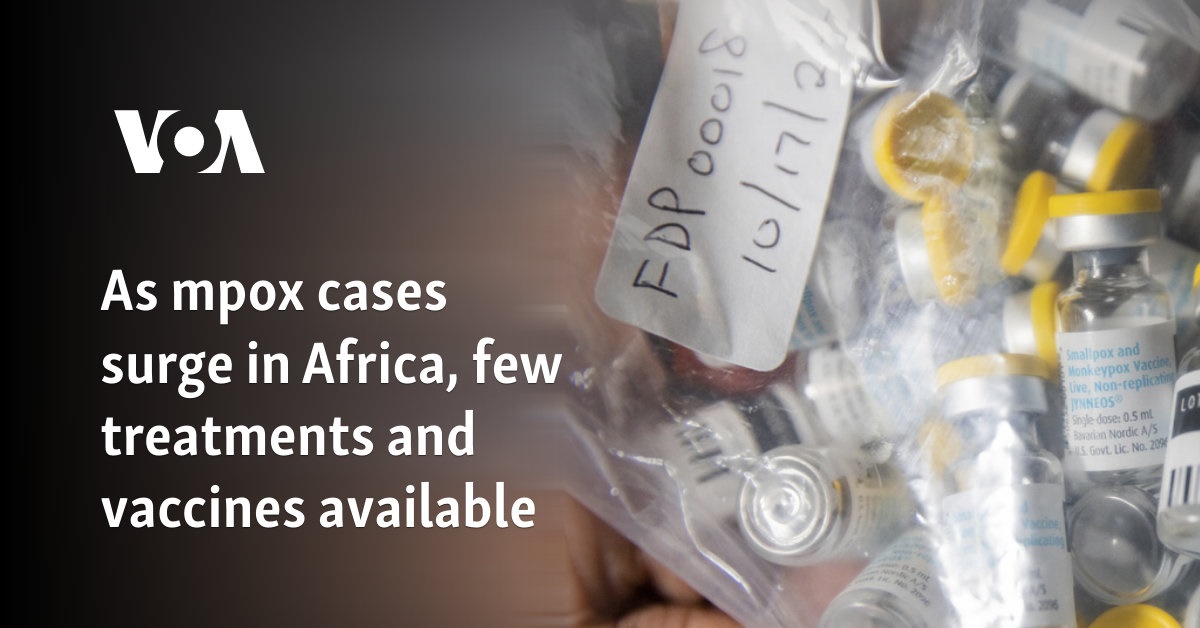African health officials say there has been a 160% surge in MPOX cases since the start of the year and warn that the continent is at high risk of further spread because there are no effective treatments or vaccines.
The Africa Centers for Disease Control and Prevention said in a report released Wednesday that MPOX, also known as monkeypox, has been detected in 10 African countries this year, including Congo, where more than 96 percent of all cases and deaths occur.
According to authorities, around 70% of Congo's infections are among children under the age of 15, and 85% of deaths are in this age group.
There have been an estimated 14,250 cases so far this year, roughly the same number as the total number of cases in the entire year last year. Compared to the first seven months of 2023, the Africa CDC said the number of cases has increased by 160% and the death toll has risen by 19% to 456.
Both Burundi and Rwanda reported their first outbreaks of the virus this week.
New outbreaks were also declared in Kenya and the Central African Republic this week, with cases reaching as far as the densely populated capital, Bangui.
“We are very concerned about the cases of monkeypox that are hitting (the capital region),” Central African Republic's Health Minister Pierre Somse said on Monday.
The Kenyan Ministry of Health said on Wednesday that MPOX had been detected in a passenger travelling from Uganda to Rwanda at a border crossing in southern Kenya. In a statement, the ministry said even one case of MPOX is enough to declare an outbreak.
The Africa CDC said the death rate from MPOX this year is around 3%, “much higher on the African continent compared to other parts of the world.” During the 2022 global MPOX emergency, less than 1% of people infected with the virus have died.
Earlier this year, scientists reported the emergence of a new, more deadly strain of mpox in a mining town in the Congo, killing up to 10% of people, raising concerns that it may spread more easily between humans. Mpox is spread through close contact with infected people, including through sexual contact.
An analysis of patients hospitalized in eastern Congo between October and January suggests that recent genetic mutations in the virus are the result of ongoing transmission between humans.
Previous MPOX epidemics primarily involved lesions on the chest, hands, and feet, but the new form of MPOX is harder to detect because symptoms are milder and lesions primarily appear on the genitals.
Medical charity Doctors Without Borders described the growing MPOX outbreak as “alarming”, noting that the disease has also been found in camps for displaced people in North Kivu province of Republic of Congo, which borders Rwanda.
“There is certainly a risk of an explosion, given the large population movements,” said Dr. Louis Massing, the group's medical director for Congo.
While Mpox outbreaks in Europe and the United States have been largely contained thanks to vaccines and treatments, most African countries, including Congo, have no access to these.
“We can only plead for vaccines to arrive in the country as quickly as possible to protect residents in the hardest-hit areas,” Massing said in a statement.
The WHO said in May that not a single donor dollar had been committed to containing MPOX, despite the ongoing outbreak in Africa and the potential for the disease to spread internationally.
Earlier this week, the Coalition for Epidemic Preparedness Innovations announced that a study would begin next month in Congo and other African countries to see whether giving people a pox vaccine after they've been exposed to the disease could prevent severe illness and death.





